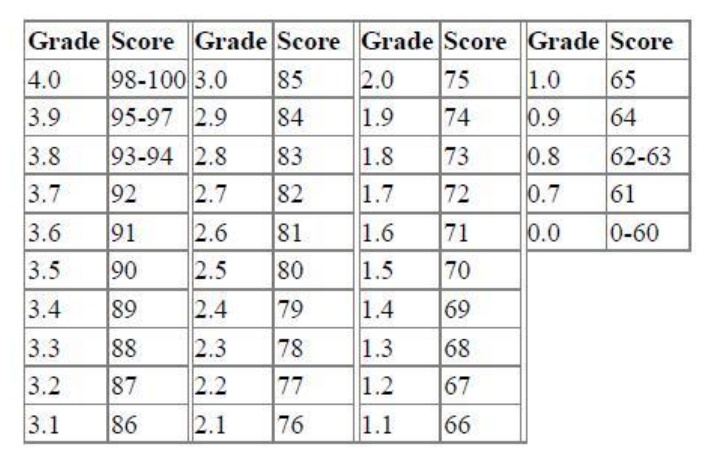TCSS 422: Operating Systems |
|
|
|
Grading Policy Weights are assigned to the different elements of the course as listed below. Points are added up at the end of the quarter and weighted accordingly to determine a total percentage score. The percentage score is translated into a final decimal point (4.0 max) grade.
UW Grading Scale 
Tutorials / Quizzes / In-class Activities There will be a maximum of 1 quiz, tutorial, or in-class activity per week during the quarter. Some quizzes will be in class, while others will be online on the Canvas system. These quizzes and activities will generally be short, and test basic comprehension of concepts. The lowest 2 quiz grades will be dropped throughout the quarter. Exams / Assignments There will be two exams during the quarter, the midterm exam, and the final exam. Each is comprehensive covering conceptual areas of the course. There will be no make-up exams or quizzes. Please schedule vacations, job interviews, family visits, etc. around the exams. If there is a family or medical emergency that prevents you from attending the midterm or final exam, please arrange by providing written explanation as soon as possible to request a make-up exam. Given the extreme difficulty to create two different tests of identical difficulty and challenge, and to ensure fairness to everyone, makeup exams will be a similar length and format, but will feature more difficult questions. It is expected that since make up exams will generally occur after the original exam, students will have additional time to prepare for a more rigorous exam. The best plan is to make every effort to take exams when originally scheduled. All assignments are due at 11:59 PM on the due date unless specified otherwise. There is a 36-hour grace period on all late assignments. These assignments will be marked as late in Canvas, and the cumulative timeliness of assignments may be referred to for grade curving/rounding decisions and for future employer/letters of recommendation, etc. Occasionally submitting a few late assignments is not an issue. Submitting EVERY assignment late is a potential cause of concern. Assignments submitted from 36 to 48 hours late may receive a 5% late penalty. After two days, each subsequent day an assignment is late may result in an additional late penalty of 5% per day for a maximum of 15% for up to 4 days. Late submissions more than 96 hours late will receive a zero score without prior arrangement with the intructor. When possible, assignments will be posted at least two weeks prior to the due date. All of the programming assignments should be submitted online via Canvas. Source code should be submitted as a tar gzip archive file. Included executable files are deleted and programs are then rebuilt from source for grading. Programs or source code sent via email will not be graded. The Canvas system will accept and date source submissions throughout the quarter. Assignments may include programming and/or written components. Programming projects will relate to the lecture and textbook readings throughout the quarter. The projects will use Linux. It is *HIGHLY* recommended to create a local Linux Virtual Machine on a laptop or desktop computer (Ubuntu or CentOS) to support program development. You may use your own systems with a Linux distribution (recommended are Ubuntu and CentOS) or use network-accessible Virtual Machines (VMs) with a Linux distribution (Ubuntu and CentOS recommended) with full root access. The projects will reinforce core OS concepts such as scheduling and memory management. The details of each project will be posted HERE. Academic Integrity and Collaboration Policy To quote the UWT statement of values, "our fundamental purpose is to educate students for life as global citizens." Students are active participants in their education and are expected to uphold high standards of academic conduct. Any action that subverts the educational process or misrepresents student knowledge and abilities constitutes academic dishonesty. Links: UW Tacoma Student Conduct Code UW Tacoma - Academic Honesty In this course some assignments and all exams must be completed individually. When collaboration is permitted for an assignment, this will be noted in the instructions. With respect to student collaboration, these actions are acceptable:
|